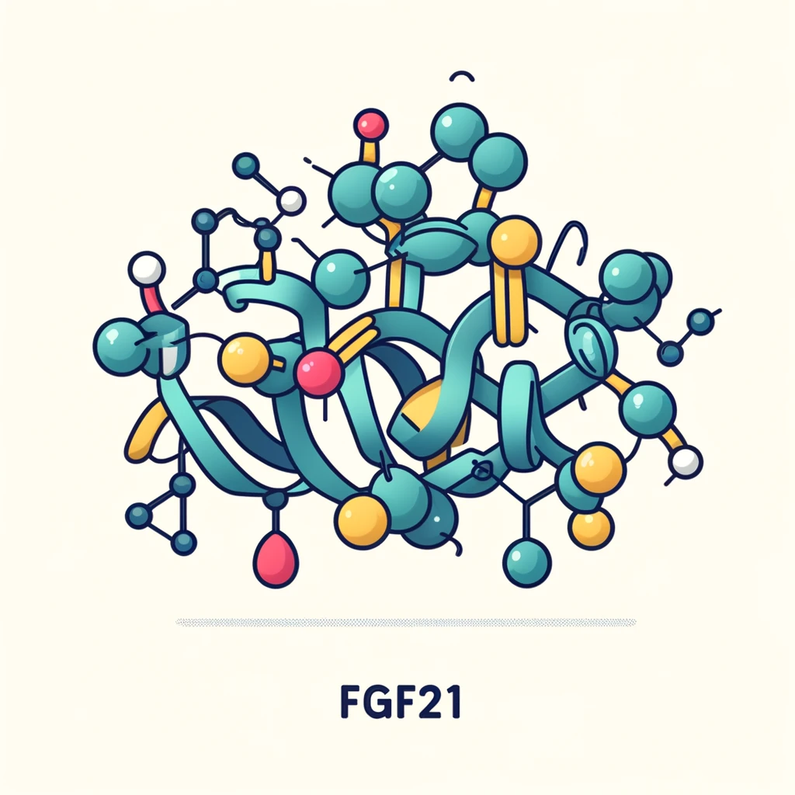Examining the Effects of FGF21 on Metabolism and Weight Management: From Glucose to Fat
The protein hormone known as fibroblast growth factor 21, or FGF21, is essential for controlling a number of the body's metabolic functions. Since its discovery in 2000, FGF21 has attracted a lot of interest from scientists and pharmaceutical companies because of its possible therapeutic uses in the treatment of diabetes, metabolic disorders, and obesity.
The Role of FGF21 in Metabolism
Control of Lipid and Glucose Metabolism
Controlling the metabolism of fats and carbohydrates is one of FGF21's main roles. By encouraging the uptake of glucose in cells and preventing gluconeogenesis—the liver's process of producing glucose—it contributes to the maintenance of stable blood sugar levels. Furthermore, FGF21 promotes fat breakdown, which raises energy expenditure and promotes weight loss.
Impacts on Sensitivity to Insulin
Additionally, FGF21 is critical for enhancing insulin sensitivity, which is necessary for preserving appropriate blood sugar levels. Type 2 diabetes and insulin resistance are prevented by FGF21, which improves insulin action in tissues like muscle and adipose tissue and lowers blood glucose levels.
FGF21 and Weight Management
Regulation of Appetite
Apart from its impact on metabolism, FGF21 has also been demonstrated to control appetite. Studies have shown that FGF21 can decrease food intake and suppress hunger, suggesting that it could be a target for the creation of anti-obesity drugs.
Metabolic Fat
Moreover, FGF21 encourages the breakdown of adipose tissue's fat reserves, which releases fatty acids needed for energy synthesis. This procedure, called lipolysis, aids in weight loss and could support people in maintaining a balanced body composition.
Potential Therapeutic Applications of FGF21
Management of Metabolic Disorders and Obesity
FGF21 has become a promising therapeutic target for the treatment of obesity and associated metabolic disorders due to its role in encouraging weight loss and enhancing metabolic health. Pharmaceutical companies are working hard to develop FGF21 agonists and analogs as possible medications to treat obesity and its related conditions.
Function in the Management of Diabetes
FGF21 exhibits promise in the treatment of diabetes in addition to its possible advantages for obesity. FGF21-based treatments may provide better blood sugar regulation and less insulin injection dependency for people with type 2 diabetes by enhancing insulin sensitivity and glucose metabolism.
Challenges and Limitations
FGF21-based therapies have a number of drawbacks and obstacles despite their therapeutic potential. These include possible adverse effects like liver toxicity and bone loss, as well as concerns about the safety and long-term effectiveness of FGF21 analogs.
Future Directions in FGF21 Research
Future research will probably concentrate on finding new therapeutic targets and maximizing the clinical application of FGF21-based treatments as scientists continue to sort through the complexities of FGF21 signaling and metabolism. Furthermore, continued studies will aim to clarify the processes behind FGF21's impact on metabolism and its possible involvement in various other medical disorders.
In summary
In summary, FGF21 is a potential target for the management of diabetes, metabolic diseases, and obesity. It is a strong contender for medication development because of its effects on appetite and fat metabolism, as well as its capacity to control glucose and lipid metabolism. To address the drawbacks and restrictions of FGF21-based treatments, however, and to fully realize their therapeutic potential, more study is required.
FAQs
- What are the body's primary uses for FGF21?
- FGF21 is essential for controlling appetite and fat metabolism, enhancing insulin sensitivity, and managing glucose and lipid metabolism.
- How is FGF21 related to weight management?
- By boosting energy expenditure, reducing appetite, and encouraging the breakdown of fat reserves, FGF21 aids in the promotion of weight loss.
- Are treatments based on FGF21 accompanied by any side effects?
- Liver toxicity and bone loss are two possible adverse effects of FGF21 analogs; however, further studies are required to completely comprehend their safety profile.
- What are the current obstacles in the development of treatments based on FGF21?
- Optimizing the safety and efficacy of FGF21 analogs, managing possible adverse effects, and guaranteeing long-term efficacy are among the challenges.
- What prospects does research and therapy development around FGF21 have going forward?
- Future studies should concentrate on finding new therapeutic targets, enhancing the application of FGF21-based treatments in clinical settings, and deepening our knowledge of FGF21's function in metabolism and health.
Recent Posts
-
Examining the Effects of FGF21 on Metabolism and Weight Management: From Glucose to Fat
Knowing Fibroblast Growth Factor 21 (FGF21)The protein hormone known as fibroblast growth factor 21, …29th Apr 2024 -
MyBiosource UK & Europe Distribution
MyBioSource ELISA kits and antibodies are distributed by Gentaur BV in all European countries. …15th Feb 2014



